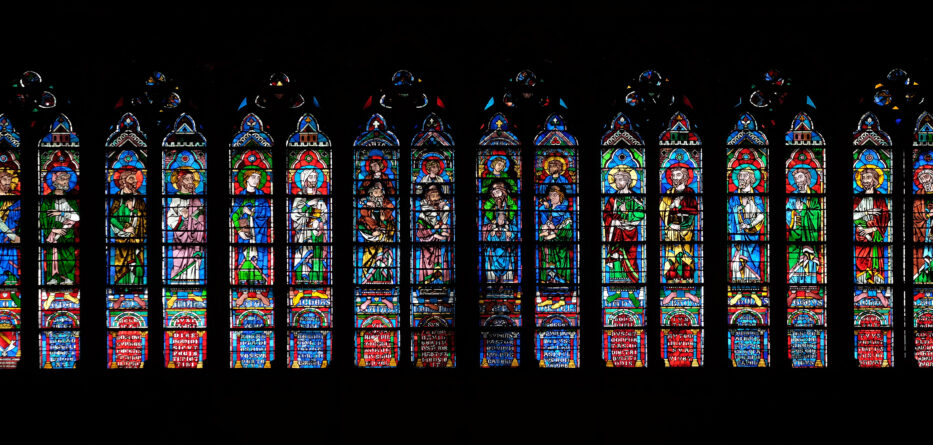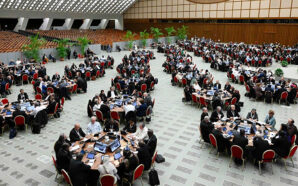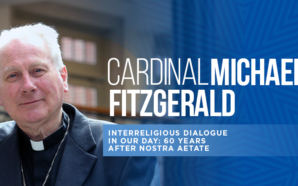(The views expressed in this article are those of the author and do not necessarily reflect the official editorial position of La Croix International)
William Grimm’s recent article concerning Benedict XVI — “The last pope of the Second Church?” — contributes to the discussion of the Catholicism’s future in places outside of St. Peter’s Square.
While other commentators argue the merits of a “papal funeral” over a Christian burial Mass or a eulogy over a homily, Grimm’s substantive issue is that Benedict XVI’s view of the world and the Church was an entrenched Western European one. However, the neo-Benedictine view of Joseph Ratzinger did not reflect broader contemporary Western or European Catholic thinking concerning the world, the Church and the liturgy.
In his 2006 Regensburg lecture — the speech that enraged Muslims because they felt Islam was categorized as a religion of conversion through violence — Benedict’s more significant argument concerned what he saw as the fundamental synthesis between Hellenistic philosophy and scripture that underscored theology and liturgy. He believed it was being attacked by a process of “dehellenization” that was undermining both Christianity and the Catholic Church.
Benedict argued that the “synthesis with Hellenism” during the early Church was not ‘an initial inculturation’ that could be done away; instead, it is the “foundational” synthesis that underpins Christian theology, western thought and Catholic liturgy. The classic synthesis with Hellenism makes sense of Scripture, Tradition and Magisterium, orders, laity and sacraments. It is a neat package deal presented in a theological language that is essential to the work of theology itself. Accordingly, Christian theology’s reliance on the Greco-Romanized philosophical tradition means that theology without this philosophical underpinning is inferior.
An argument that sounds foreign to non-Europeans
Pope Benedict was correct when he observed that the weakening of this classic synthesis had reframed the modern European worldview, resulting in Europe no longer being a Christian continent of Christian nations. His appeal to Europeans to return to their natural synthesis begs the question: to whom was he speaking?
Benedict’s perspective is an acutely “Western” or eurocentric one. His argument sounds foreign to non-Europeans, and thus it fails to be a universal argument for members of cultures with their own centuries-old synthesizes of thinking, doing and writing. At times his appeal to the classic synthesis looked like a desperate attempt to hold back the march of time and ignore the significant twentieth-century forces of cultural and social change to which the Church was subject.
Benedict’s argument becomes problematic the more it insists that the Greek philosophical tradition is the normative pattern of authentic Christianity, theology, worship and scriptural interpretation.The problem is that the argument privileges a cultural formulation of knowledge over all other possible formulations and then posits it as the basis of theological authenticity. This way, it builds a lex orandi/lex credendi-like relationship that privileges the received (given) form of theology over the vernacular (local) form. When applied to the liturgy, the received “Roman form” is considered better than a “vernacular or local form”.
Benedict’s argument fails to see contemporary Catholicism’s emerging, enculturated global character as a resumption of authentic vernacular traditions, not an innovation. He was a pope of the second Church and not of the emerging global Church because his argument fails to acknowledge that non-Greek and non-European intellectual traditions have also framed — and are framing –Christian theology and liturgical practice.
The irreversible transition from a “Western church” to a “global church”
Grimm notes that “most Christians are living their faith at various points along a road to something so new it can be characterized as a Third Church”. This third Church, having passed through the Exodus experience of Vatican II (1962-65) and the 60 years of wandering since then, seeks a new synthesis between the local vernacular and the received tradition, between the euro-centric and the often submerged indigenous traditions of belief, worship and community.
Benedict’s argument and Grimm’s article alert us to Roman Catholicism’s irreversible transition from a “Western church” to a “global church” from a second to a third Church, from universal uniformity in received worship and theology to universal pluriformity in vernacular theology and worship.
To achieve the liturgy’s mission of full, authentic, active participation in worship and ecclesial life, the singularly most important synthesis of belief and worship (lex orandi, lex credendi) must be honoured. That is why Traditionis custodes had to reverse the misguided purpose of Summorum Pontificum and restore the authentic relational basis between the vernacular and the received traditions. The ancient synthesis –what is prayed is what is believe — makes sense of all vernacular syntheses within the received tradition.
Establishing this new synthesis in each local Church takes time and dialogue, where Grimm’s woman “of color”, “a poor woman”, “one of the mothers of the Third Church” is not “spoken to” as the passive receiver of the classic synthesis but “spoken with” as a partner in the vernacular synthesis.
J.P. Grayland is a presbyter of Palmerston North Catholic Diocese in New Zealand. His latest book is Liturgical Lockdown: Covid and the Absence of the Laity (Te Hepara Pai, 2021).
With thanks to La Croix International, where this article originally appeared.








